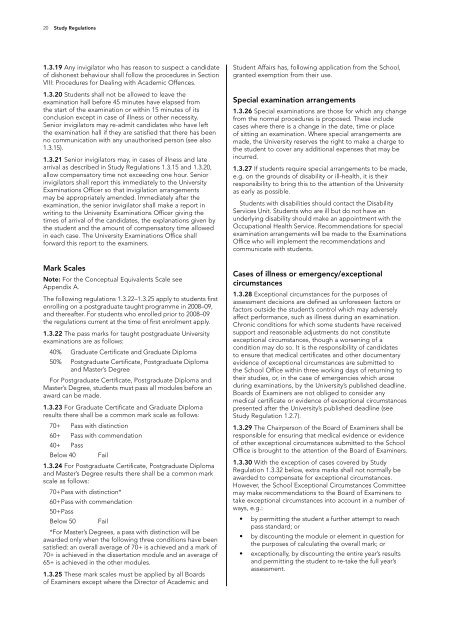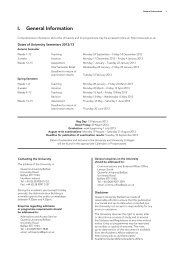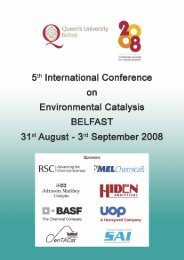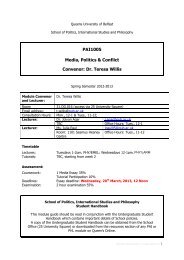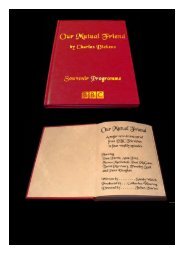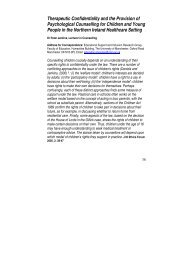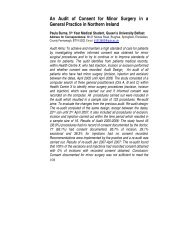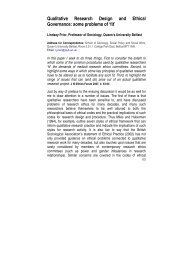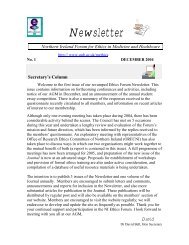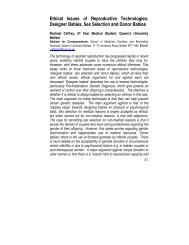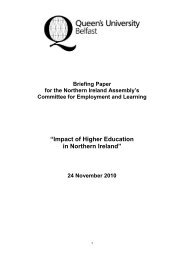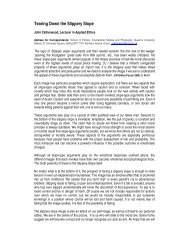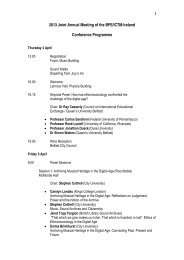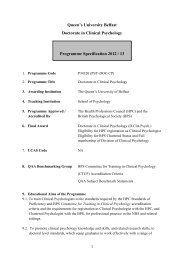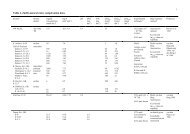University Calendar for Postgraduate Students 2012/13 - Queen's ...
University Calendar for Postgraduate Students 2012/13 - Queen's ...
University Calendar for Postgraduate Students 2012/13 - Queen's ...
You also want an ePaper? Increase the reach of your titles
YUMPU automatically turns print PDFs into web optimized ePapers that Google loves.
20 Study Regulations<br />
1.3.19 Any invigilator who has reason to suspect a candidate<br />
of dishonest behaviour shall follow the procedures in Section<br />
VIII: Procedures <strong>for</strong> Dealing with Academic Offences.<br />
1.3.20 <strong>Students</strong> shall not be allowed to leave the<br />
examination hall be<strong>for</strong>e 45 minutes have elapsed from<br />
the start of the examination or within 15 minutes of its<br />
conclusion except in case of illness or other necessity.<br />
Senior invigilators may re-admit candidates who have left<br />
the examination hall if they are satisfied that there has been<br />
no communication with any unauthorised person (see also<br />
1.3.15).<br />
1.3.21 Senior invigilators may, in cases of illness and late<br />
arrival as described in Study Regulations 1.3.15 and 1.3.20,<br />
allow compensatory time not exceeding one hour. Senior<br />
invigilators shall report this immediately to the <strong>University</strong><br />
Examinations Officer so that invigilation arrangements<br />
may be appropriately amended. Immediately after the<br />
examination, the senior invigilator shall make a report in<br />
writing to the <strong>University</strong> Examinations Officer giving the<br />
times of arrival of the candidates, the explanations given by<br />
the student and the amount of compensatory time allowed<br />
in each case. The <strong>University</strong> Examinations Office shall<br />
<strong>for</strong>ward this report to the examiners.<br />
Student Affairs has, following application from the School,<br />
granted exemption from their use.<br />
Special examination arrangements<br />
1.3.26 Special examinations are those <strong>for</strong> which any change<br />
from the normal procedures is proposed. These include<br />
cases where there is a change in the date, time or place<br />
of sitting an examination. Where special arrangements are<br />
made, the <strong>University</strong> reserves the right to make a charge to<br />
the student to cover any additional expenses that may be<br />
incurred.<br />
1.3.27 If students require special arrangements to be made,<br />
e.g. on the grounds of disability or ill-health, it is their<br />
responsibility to bring this to the attention of the <strong>University</strong><br />
as early as possible.<br />
<strong>Students</strong> with disabilities should contact the Disability<br />
Services Unit. <strong>Students</strong> who are ill but do not have an<br />
underlying disability should make an appointment with the<br />
Occupational Health Service. Recommendations <strong>for</strong> special<br />
examination arrangements will be made to the Examinations<br />
Office who will implement the recommendations and<br />
communicate with students.<br />
Mark Scales<br />
Note: For the Conceptual Equivalents Scale see<br />
Appendix A.<br />
The following regulations 1.3.22–1.3.25 apply to students first<br />
enrolling on a postgraduate taught programme in 2008–09,<br />
and thereafter. For students who enrolled prior to 2008–09<br />
the regulations current at the time of first enrolment apply.<br />
1.3.22 The pass marks <strong>for</strong> taught postgraduate <strong>University</strong><br />
examinations are as follows:<br />
40% Graduate Certificate and Graduate Diploma<br />
50% <strong>Postgraduate</strong> Certificate, <strong>Postgraduate</strong> Diploma<br />
and Master’s Degree<br />
For <strong>Postgraduate</strong> Certificate, <strong>Postgraduate</strong> Diploma and<br />
Master’s Degree, students must pass all modules be<strong>for</strong>e an<br />
award can be made.<br />
1.3.23 For Graduate Certificate and Graduate Diploma<br />
results there shall be a common mark scale as follows:<br />
70+ . Pass with distinction<br />
60+ . Pass with commendation<br />
40+ . Pass<br />
Below 40 Fail<br />
1.3.24 For <strong>Postgraduate</strong> Certificate, <strong>Postgraduate</strong> Diploma<br />
and Master’s Degree results there shall be a common mark<br />
scale as follows:<br />
70+ Pass with distinction*<br />
60+ Pass with commendation<br />
50+ Pass<br />
Below 50 Fail<br />
*For Master’s Degrees, a pass with distinction will be<br />
awarded only when the following three conditions have been<br />
satisfied: an overall average of 70+ is achieved and a mark of<br />
70+ is achieved in the dissertation module and an average of<br />
65+ is achieved in the other modules.<br />
1.3.25 These mark scales must be applied by all Boards<br />
of Examiners except where the Director of Academic and<br />
Cases of illness or emergency/exceptional<br />
circumstances<br />
1.3.28 Exceptional circumstances <strong>for</strong> the purposes of<br />
assessment decisions are defined as un<strong>for</strong>eseen factors or<br />
factors outside the student’s control which may adversely<br />
affect per<strong>for</strong>mance, such as illness during an examination.<br />
Chronic conditions <strong>for</strong> which some students have received<br />
support and reasonable adjustments do not constitute<br />
exceptional circumstances, though a worsening of a<br />
condition may do so. It is the responsibility of candidates<br />
to ensure that medical certificates and other documentary<br />
evidence of exceptional circumstances are submitted to<br />
the School Office within three working days of returning to<br />
their studies, or, in the case of emergencies which arose<br />
during examinations, by the <strong>University</strong>’s published deadline.<br />
Boards of Examiners are not obliged to consider any<br />
medical certificate or evidence of exceptional circumstances<br />
presented after the <strong>University</strong>’s published deadline (see<br />
Study Regulation 1.2.7).<br />
1.3.29 The Chairperson of the Board of Examiners shall be<br />
responsible <strong>for</strong> ensuring that medical evidence or evidence<br />
of other exceptional circumstances submitted to the School<br />
Office is brought to the attention of the Board of Examiners.<br />
1.3.30 With the exception of cases covered by Study<br />
Regulation 1.3.32 below, extra marks shall not normally be<br />
awarded to compensate <strong>for</strong> exceptional circumstances.<br />
However, the School Exceptional Circumstances Committee<br />
may make recommendations to the Board of Examiners to<br />
take exceptional circumstances into account in a number of<br />
ways, e.g.:<br />
• by permitting the student a further attempt to reach<br />
pass standard; or<br />
• by discounting the module or element in question <strong>for</strong><br />
the purposes of calculating the overall mark; or<br />
• exceptionally, by discounting the entire year’s results<br />
and permitting the student to re-take the full year’s<br />
assessment.


